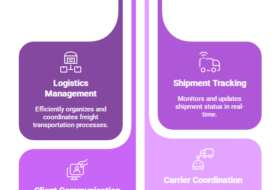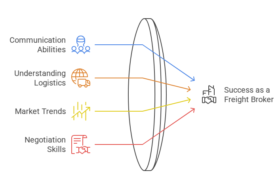Freight Broker License Requirements
Are you ready to dive into the world of freight brokering? Becoming a freight broker offers an exciting opportunity to enter the logistics industry and establish a successful business. However, before you embark on this venture, it’s crucial to understand the freight broker license requirements. In this comprehensive guide, we will walk you through the necessary qualifications, application process, and frequently asked questions to help you kick-start your brokerage business.
Understanding the Role of a Freight Broker
Before diving into the license requirements, let’s clarify the role of a freight broker. A freight broker acts as a middleman between shippers and carriers, facilitating the transportation of goods. Brokers play a crucial role in connecting businesses with reliable carriers, negotiating rates, and ensuring smooth logistics operations.
Licensing Authority and Regulations
In the United States, the Federal Motor Carrier Safety Administration (FMCSA) is the regulatory body responsible for overseeing freight brokerage operations. FMCSA ensures compliance with federal regulations and establishes the guidelines for obtaining a freight broker license.
Freight Broker License Types
There are two primary types of freight broker licenses: the Property Broker License and the Household Goods Broker License. The Property Broker License covers the transportation of general freight, while the Household Goods Broker License focuses on the movement of personal belongings.
Eligibility Criteria for Obtaining a Freight Broker License
To obtain a freight broker license, certain eligibility criteria must be met. These criteria typically include:
- Legal Age Requirement: You must be at least 18 years old to apply for a freight broker license.
- Business Entity: Establish a legal business entity, such as a sole proprietorship, partnership, or corporation.
- Responsible Individual: Designate a responsible individual within your business who will oversee brokerage operations.
- Financial Responsibility: Demonstrate financial responsibility by maintaining a surety bond and appropriate insurance coverage.
Now that we have explored the freight broker license requirements, let’s proceed to the application process.
Application Process for a Freight Broker License
Research and Preparation
Before diving into the application process, thorough research and preparation are essential. Familiarize yourself with the industry, market trends, and regulatory requirements. Additionally, consider developing a comprehensive business plan to outline your brokerage’s goals, strategies, and financial projections.
Registering Your Business Entity
To start the application process, register your business entity with the appropriate state authorities. Choose a business name that aligns with your brand and ensures it is unique and not already in use.
Obtaining a USDOT Number
As a freight broker, you must obtain a USDOT number from the FMCSA. This unique identifier is required for tracking and monitoring your business’s activities. The USDOT number is obtained through the FMCSA’s Unified Registration System (URS).
Acquiring a BOC-3 Filing
A BOC-3 filing is essential for establishing a legal presence in all states in which you plan to operate. This process designates process agents who can accept legal documents on your behalf. Ensure you work with a registered agent or a reputable process agent service to complete the BOC-3 filing.
Proof of Insurance
Maintaining appropriate insurance coverage is a critical requirement for obtaining a freight broker license. This includes obtaining both liability insurance and cargo insurance to protect your business and the goods you transport.
Surety Bond Requirement
One of the crucial freight broker license requirements is maintaining a surety bond. The FMCSA requires brokers to have a $75,000 surety bond or trust fund in place to provide financial security to shippers and carriers.
Completing the Application Forms
To finalize your application, complete the necessary forms provided by the FMCSA. These forms include the OP-1 Application for Motor Property Carrier and Broker Authority, which collects essential information about your business and operations. Additionally, you will need to submit the required fees to process your application.
Now that we have explored the application process, let’s address some frequently asked questions regarding freight broker license requirements.
FAQs about Freight Broker License Requirements
Q1: What is a freight broker’s main responsibility?
A freight broker’s main responsibility is to facilitate the movement of goods between shippers and carriers. They act as intermediaries, connecting businesses in need of transportation with reliable carriers. Brokers negotiate rates, handle paperwork, and ensure smooth logistics operations.
Q2: What are the different types of freight broker licenses?
The two primary types of freight broker licenses are the Property Broker License and the Household Goods Broker License. The Property Broker License covers the transportation of general freight, while the Household Goods Broker License focuses on the movement of personal belongings.
Q3: Do I need prior experience to become a freight broker?
No, prior experience is not mandatory to become a freight broker. However, it is beneficial to have a good understanding of the logistics industry, market trends, and negotiation skills. Consider investing time in learning about freight brokerage operations and building a network of industry professionals.
Q4: Can I start a freight brokerage business without a license?
No, operating a freight brokerage business without a license is illegal in the United States. Obtaining a freight broker license is a crucial step to ensure compliance with federal regulations and to build trust with shippers and carriers.
Q5: How long does it take to obtain a freight broker license?
The timeframe for obtaining a freight broker license can vary depending on several factors, such as the completeness of your application and the workload of the FMCSA. Typically, the process takes around 4 to 8 weeks, although it can be longer in some cases.
Q6: What happens if my freight broker license application is denied?
If your freight broker license application is denied, the FMCSA will provide a written explanation for the denial. It is essential to carefully review the reasons and take appropriate actions to rectify any deficiencies. You may have the opportunity to appeal the decision or reapply after addressing the issues raised by the FMCSA.
Conclusion
Becoming a freight broker can be a rewarding and lucrative venture, but it requires meeting the necessary freight broker license requirements. By understanding the licensing authority, eligibility.
Growth + Change = Opportunity! How are you going to capitalize on the opportunity as a freight broker, agent, dispatcher or box truck carrier?







